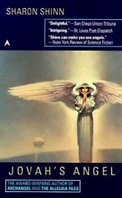
| Series: | Samaria #2 |
| Publisher: | Ace |
| Copyright: | May 1997 |
| Printing: | April 1998 |
| ISBN: | 0-441-00519-5 |
| Format: | Mass market |
| Pages: | 358 |
This is the second book in Shinn's Samaria series, following Archangel, but it takes place several hundred years later and stands well on its own. You could start here, although I recommend beginning with Archangel instead.
Shinn writes romantic SF. The originality of the world background isn't the strength of her books. They live and die on the strength of the characters, particularly the romantic leads, and they're best consumed as light reading rather than as something to analyze deeply. That being said, the background of Archangel had an intriguing charm. It held a delicate balance between a fantasy outlook for the characters and a clearly science-fictional setting that the reader could try to guess at and unravel. In that previous book, Shinn gave few details and didn't confirm reader guesses, leaving the true situation ambiguous. This was frustrating, but it also meant the reader stayed interested in the background and there was no danger of the actual background falling short of expectations.
It isn't much surprise that in Jovah's Angel, we get more details of the world background and the science-fictional aspects come more to the forefront. It might have been better, and certainly less tricky, to leave the nature of the world ambiguous, but that's not what people expect (and I admit that I wanted to learn more). Unfortunately, this is risky, and Jovah's Angel shows exactly why it's risky.
For those who have not read the Samaria series before, it has a roughly Renaissance level of technology and a world clearly named after the area around Israel and just as clearly not actually set there. The twist is that, in this world, angels are living, breathing beings who serve as guardians and quasi-rulers and who intercede with Jovah (God) for the people. The primary form of intercession is weather alterations, ending storms or droughts, but everyone must also gather once a year to sing praise to Jovah or the world will be destroyed. (If this sounds quite a bit like Pern to you, well, it does to me too, although the angels are an interesting and well-handled twist that go a different direction than the dragonriders.)
As Jovah's Angel opens, industry is growing across Samaria, leading to sharper distinctions between rich and poor, pollution, and increased understanding of how the residual technology of the world may actually work. (Only the last is dealt with significantly in this book.) The archangel is a brash, dramatic leader, but when she is caught in a freak storm and badly injured, Jovah selects through his oracles a new archangel a reclusive scholar completely unready to rule. Together with an agnostic experimental scientist who particularly loves engines, they do all the obvious things: fall in love, save the world, discover more about Jovah, and otherwise arrange a happy ending.
As a romance, it's not bad. I could take or leave Caleb, the scientist, but both the archangel Alleya and the former archangel Delilah are quite enjoyable. I wouldn't say either is a unique and memorable character, but for this sort of book they work, which mostly means they can banter, they pull emotional strings with reasonable timing, and I was rooting for them. Delilah goes the farthest towards originality, I think, but I like the cynical loners.
The problem lies in the interaction with the background. To give details would involve significant spoilers, so I'll stop with saying that the revelations about Jovah steal much of the magic and mystery (and hence much of the charm) out of the book and the universe. I'm not sure if there was a way to not do this and still show more of what's behind the curtain, but the explanation Shinn chose clashed with the flavor of the world for me. The delicate balance between religion and pragmatism stumbles badly under the weight of additional, rather prosaic and unmagical knowledge and the characters don't deal with it well. In the end, it mostly gets shoved under the rug, after some extended and rather painful dialogue and introspection that tries to tackle fundamental questions of faith and belief and mostly doesn't. There may be material for difficult religious questions in future books here, but frankly I'm not sure the substance of Shinn's universe is strong enough to support that kind of book. Shinn's characters work well in a light romantic fantasy full of music and evocative descriptions of angelic flight; soul-searching debates over truth and divinity feel out of place.
A disappointing ending aside, this book still served the purpose I picked it up for. It's a simple romance with unambiguous emotional string-pulling and characters one can root for. There's a little plot-driven stupidity — I wish Alleya would have figured out the obvious about her search far earlier on — but that often comes with the romance territory and I can make allowances. The ending, though, means I can't recommend it wholeheartedly and I'm worried about the rest of the series. Archangel was much better.
Followed by The Alleluia Files.
Reviewed: 2006-04-09